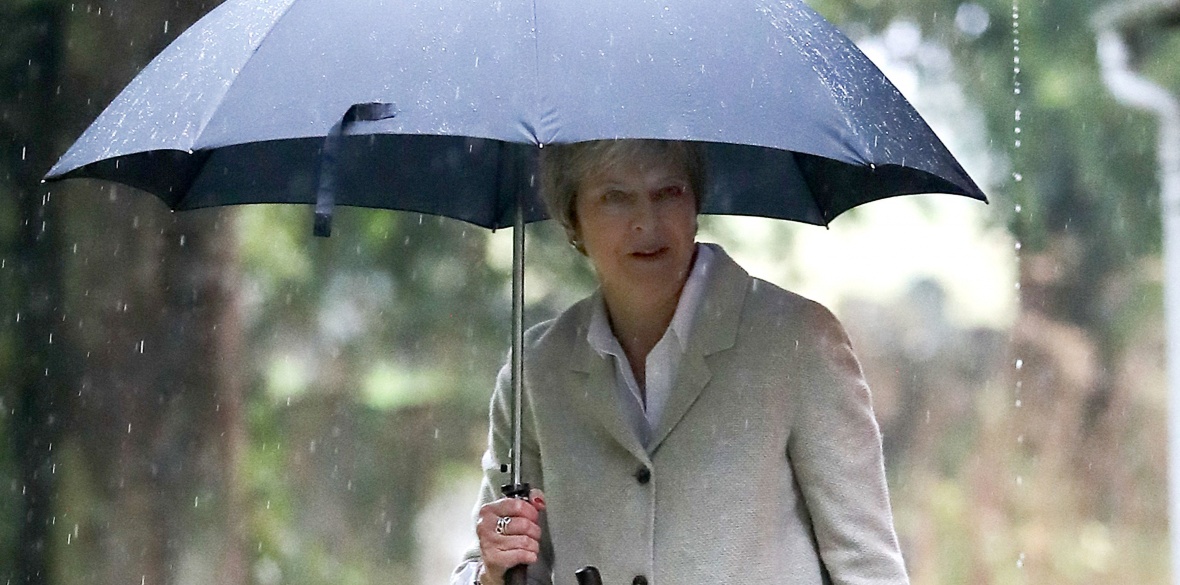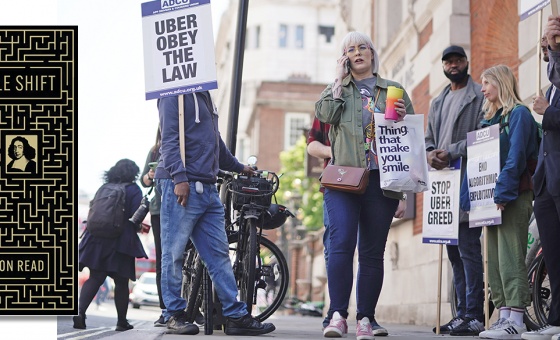This is the last article you can read this month
You can read more article this month
You can read more articles this month
Sorry your limit is up for this month
Reset on:
Please help support the Morning Star by subscribing here
BRITAIN is heading towards a full-blown political crisis in a matter of weeks.
Even if the backdrop holds up at the Tory conference, their rancorous divisions are set to be on open display.
One reason for the palpably rising political pressure is this week’s successful Labour Party conference.
In particular, Jeremy Corbyn’s speech managed to place that pressure squarely back on the government and Tory Party by resisting demands from the Blairite-run “People’s Vote” operation to commit to a second referendum. That is the one course of action that could bring relief to the government, sink Labour and put an early general election and victory out of reach.
Those running the second referendum campaign know that. And that is, indeed, the point of it. Even if some on the left sincerely believe otherwise, they are not running the show. The likes of Peter Mandelson are — people who have boasted of working night and day to stop Corbyn entering 10 Downing Street.
Labour’s conference adopted a compromise composite motion on Brexit. But it did put centrally the focus upon forcing a general election. That was despite efforts by Keir Starmer to transform a position of not ruling out hypothetical tactics to defeat the government into a declaration of support for a rerun of the referendum two years ago.
Pro-EU cheerleaders in the media played up that intervention for all it was worth. We should expect more of the same as the political crisis intensifies. Establishment figures will bend might and main to shift Labour’s compromise conference formula in the direction of a second referendum and not of a general election that could well see Labour become the biggest party in Parliament.
Corbyn, however, was clear about the direction he and the leadership want to maintain. He placed the call for an election central and spoke of “… most of all, [a] commitment to a Brexit that protects jobs, the economy and trade, and determined opposition to one that does not...
“Our priority is clear — we aim to get the best Brexit deal for jobs and living standards to underpin our plans to upgrade the economy and invest in every community and region.
“That can bring people together and meet the concerns of both those who voted Leave and those who voted Remain.”
Instead of uniting working-class Leave and Remain supporters behind a radical Labour programme, the second referendum operation would divide the Labour vote, and undermine the advances made by the left over the last three years.
Instead of driving the Tory divisions wider, it would split Labour — making it the victim of an impending parliamentary crisis, not the beneficiary.
The reason why the storm that is coming in November will be so violent is that it represents the accumulation of major events over that last two years that have hollowed out the governing order. The Tories and Establishment, far from dealing with them, have piled one on top of the other.
First was the referendum itself. It was, as John McDonnell said in his speech, an anti-Establishment vote. There was lip service paid to that by many politicians and political commentators at the time. It rapidly gave way to amnesia in the complacent hope of restoring politics to the previous status quo.
That cannot obscure, however, the scale of what happened and its continuing reverberations.
From the CBI to the TUC, the Bank of England to the Church of England, every British parliamentary party and international bodies from Nato to the EU, the Establishment and institutions campaigned for Remain. Leave won — with whatever combinations of good and bad ideas among the millions who voted in the largest turnout for over two decades.
British capitalists found themselves saddled with a policy they were utterly opposed to — leaving the EU — and all thanks to David Cameron calling a referendum that he arrogantly predicted he would win 70 to 30 and bring stability.
Not only did that fail to come about, their principal political instrument, the Tory Party, was thrown into a crisis that has proved ongoing as it tries to reconcile representing capitalist interests with having to carry through the popular decision.
Worse, from the Establishment point of view, the Labour Party was not in the hands of Blair-Brown cut-outs. Corbyn had been elected nine months earlier and was in the process of undoing the New Labour years and moving in a radical reforming direction.
That’s why the “chicken coup” was launched within days of the referendum result. It provided some space for the Tories to patch things up temporarily and anoint a leader as Labour was consumed by a leadership contest.
But it failed in bringing Labour in any way back to being a reliable instrument for big business as it had been prior to 2015.
In fact, it accelerated the process of grassroots radicalisation as more joined the party on the pro-Corbyn surge and he was returned more emphatically.
The sabotage in the ranks of Labour MPs continued. A key part of it was to use the Europe issue to divide the party and push it into a centrist compact with the Lib Dems. It’s easy to forget that now given the parlous state of Vince Cable’s party.
But that, of course, became apparent only at the general election — the third major political event that is fuelling the current crisis.
It’s clear what the Establishment hoped for and expected from the election: Theresa May returned with a large majority. A more strongly Remain Parliament and grouping of Tory MPs. A significant Lib Dem recovery. A shattered Labour Party. An immediate second coup against Corbyn that would either oust him or leave him so weakened that a large grouping of centrist MPs could declare UDI.
They in turn would be able to co-operate with May in a de facto government of national unity that could undo Brexit either literally or in effect by staying inside the single market and EU institutions.
Well, we all know what happened. And a critical reason why it happened was the Labour leadership’s refusal of demands to rerun the referendum. Instead it put forward a radical manifesto that spoke to working people.
It won votes from both leavers and remainers. In other words, the kind of approach Corbyn, McDonnell and team have shown they want to stick to despite extreme pressure to abandon it.
At each stage over the last two-and-a-half years the political logic has been crystal clear. The demand that Labour adopt the Brexit policy of the Lib Dems has been about weakening the leadership and the left, and abandoning the radical terrain the party is staking out. The cynical weaponisation of charges of anti-semitism is part of the same logic, at odds with genuine concern to fight racism and the far right.
It has been about taking the heat off the hapless May government through plunging Labour into the kind of crisis that exists on the Tory benches.
And that is what it is about now. May’s humiliation at Salzburg and collapsing Chequers plan are just the start of what will be massively increasing pressure as she tries to deal with equally obdurate Tory Brexiters and EU negotiators.
Corbyn astutely at the conference put down a challenge to May to come up with a deal on terms that Labour has proposed, or get out of the way if she cannot.
The Tory chairman struggled to answer that effectively. How much easier it would be for him and May if they could paint Labour as undemocratically wanting a second Remain referendum.
Tory Brexiters face their own dilemmas. If they move against May or vote down whatever she brings back from Brussels, then they may hope for a right-wing Brexit, but they risk a left-wing Corbyn government.
Those such as Chuka Umunna saying there is no prospect of a general election as Tory MPs won’t vote for one are seriously underestimating what can happen if a political meltdown takes place in the coming months. They do so at the same time as talking up the sense of national crisis and “no-deal” or “cliff-edge” Brexits.
They talk up crisis, but talk down toppling the government. They want Labour to pay the price of a rerun referendum in the hope of stabilising the governing system over the body of Corbynism, in the process creating the political space for their dreamed-of centrist realignment.
What is happening in Britain is an aspect of a European-wide phenomenon where the crash of 2008 and its aftermath have whittled down the bipartisan political systems of the neoliberal period.
Brexit brings that fundamental reality to the fore. Something is going to crack seriously in the coming months, possibly weeks.
The left and unions have it significantly in our hands to determine whether it is the Tories, the failed old politics and (already weakened) Establishment control, or the radical advances made in the Labour Party and wider movement.










